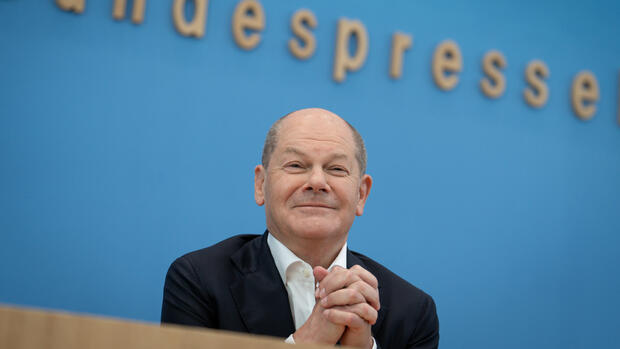At the summer press conference, the Federal Chancellor emphasized the successes of the traffic light government.
(Photo: IMAGO/Political Moments)
Berlin Almost half of the legislative period is over and the Chancellor is taking stock. At the summer press conference in Berlin on Friday, Olaf Scholz talks about the problems piling up on his desk: the Ukraine war, the upswing of the AfD, the China strategy and the dispute over the heating law. The Handelsblatt provides a summary of the most important points.
The modernization of Germany
The pace of change has been significantly accelerated, said the SPD politician. He referred to the federal government’s goal that 80 percent of electricity should come from renewable energies by 2030.
All laws have already been put in place to achieve the goal. According to industry information, the proportion is currently more than half.
The chancellor mentioned future investments: The federal government supports the settlement of semiconductor factories with enormous sums. Intel in Magdeburg is to receive almost ten billion euros from the state for a total investment volume of 30 billion euros.
He was reluctant to comment on the planned industrial electricity price that Economics Minister Robert Habeck (Greens) wants to enforce. State subsidies are intended to keep the price of electricity low for industry. European regulation doesn’t allow much, said the chancellor. “But you can take a look.”
federal budget
Although the chancellor admitted that the traffic light government’s negotiations on the budget for next year would be difficult, the direction would be right. Many did not expect that Germany would be able to comply with the debt brake again, despite a difficult special situation with the war in Ukraine. But that is a step in the right direction.
Ukraine War and Armament Expenditure
The Chancellor promised further financial support for Ukraine. The defense budget of the government in Kiev is about as high as the overall budget before the war. Ukraine cannot bear this alone.
Germany will continue to support Ukraine, said the German Chancellor.
(Photo: dpa)
Scholz again assured that the federal government wants to spend two percent of gross domestic product on defense in the long term. “Next year we will achieve this for the first time from budget funds and the special fund,” he announced.
Upswing of the AfD
Scholz cited the fact that many citizens were unsure about the future as the reason for the high ratings for the Alternative for Germany. The Chancellor said he wanted to counteract this with his policy. The modernization program launched by the federal government is important because it conveys the message: “It will end well for each and every one of us.”
The democratic parties with respect for each other in political dealings are in the large majority, emphasized Scholz. He does not see a “normalization” of right-wing ideas.
>> Read also: Concern about Germany as a location – desperately looking for an anti-AfD strategy
The chancellor was “quite confident that the AfD will not do much differently in the next federal election than in the last one”. At that time it was 10.3 percent. The AfD is currently around 19 percent in the polls.
Spouse splitting
Scholz rejected the initiative by SPD leader Lars Klingbeil – he had suggested abolishing marriage splitting. With spouse splitting, which registered civil partnerships can also use, the income of both partners is added together, then the tax rate is calculated for half of the joint income and the tax is then doubled.
disputes in the coalition
The fierce political discussions in the traffic light coalition are “no secret,” said Scholz. “Neither I nor anyone else likes that,” he admitted.
>> Read also: With the marriage splitting, Klingbeil starts a ghost debate – a comment
There had been violent controversy for months, especially with the law on replacing old oil and gas heating systems – the so-called heating law. As an explanation for the dispute, Scholz referred to the pace of innovation, which was a challenge for politicians in the discussions.
The new China strategy
Scholz explained that Germany is a global economy that is connected to the whole world. It is not about subjecting all foreign investments to state control. At the same time, he emphasized: “That we want to take a close look when it comes to issues that are important for military security and for security in general.”
More: Why the Chancellor’s Party is now changing direction
